De afgelopen tijd stond vooral in het teken van het heerlijk lange (ofschoon natuurlijk veel te korte) bezoek dat Liza aan me gebracht heeft, en de plaatsen die we samen bezocht hebben; verscheidene plaatsen in en om Tokyo (waaronder Disneyland, Kamakura en Yokohama), en de drie fraaie, historische steden Takayama, Kanazawa en Kyoto in Centraal-Japan.
Hieronder zodoende een fotoalbum van de afgelopen, pak hem beet, zes weken. Als onderschrift bij de foto's enkele van mijn persoonlijke impressies. De volgorde van de foto's is tamelijk chronologisch, beginnend bij kerstmis, eindigend in het begin van de nu bijna afgelopen week.
Veel plezier met het bekijken van dit fotoalbumpje!

Tokyo's glorie: de magnifieke wolkenkrabbers ten westen van het station van Shinjuku.
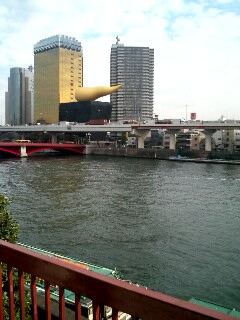
Het uitzicht dat we hadden wanneer we uit het raam van onze kamer in het schattige budgethotelletje waartoe we dankzij de rigide Victoriaanse regels van de dormitory veroordeeld waren naar buiten keken: De beroemde Sumidagawa rivier met daarachter de Asahi-bierbrouwerij (love it or hate it: het moet in elk geval een beschuimd bierglas met daarnaast een vlam voorstellen).
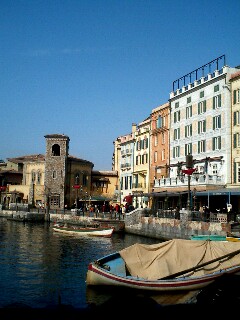
Een lang gekoesterde droom kwam uit: eindelijk bezocht ik de wereld van de perfect vormgegeven illusie, de schuilplaats van de onschuldige ondeugd, de fantasiewereld waar ik al zo lang ik mij kan heugen naar toe wil. Nee, het is géén pittoreske Italiaanse havenstad; het is fake, en het geeft het eerlijk toe (dit in tegenstelling tot de 'gewone' wereld, die wel zo hypocriet is echtheid te claimen - terwijl ze in feite niets meer is dan een collectie even illusionaire collectieve, betekenisverlenende narratieven en geloofsdogma's, althans in onze perceptie ervan). Umberto Eco had helemaal gelijk toen hij zei dat 'disneyland not only produces illusion, but - in confessing it - stimulates the desire for it.' Het is inderdaad heerlijk om je een dagje helemaal onder te dompelen in de illusie.

Het keizerlijk paleis in Tokyo.
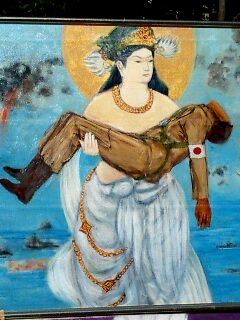
Op de verjaardag van de keizer is de Yasukuni schrijn het toneel van veel extreemnationalistisch geparadeer. In het kader hiervan was een oudere heer bezig te proberen dit (absurd lelijke) en andere, soortgelijke schilderijen te slijten. De dame op het schilderij, Kannon genaamd (alias Avalokiteshvara) is de bodhisattva van het mededogen, en één van de belangrijkste voorwerpen van religieuze verering in Japan. Dat bodhisattva's onderscheid maken tussen mensen op grond van iets banaals als hun nationaliteit had ik nog niet eerder gehoord. Waarschijnlijker is het dat de maker van dit schilderij de betekenis van het woord compassie nog niet helemaal begrepen heeft.

Een groep banzai roepende, volkslied zingende, politici bedreigende, yakuza sponsorende, naar oorlog verlangende, te laat geboren fascisten brengt een eerbetoon aan hun God, meneer de Kaiser, op Zijn verjaardag - niet toevallig op de plek waar de geesten van de hoogste officieren uit de Tweede Wereldoorlog (juist, onder meer die heren die bevel hebben gegeven de inwoners van Nanking en Shanghai af te slachten, Koreaanse dames en masse te ontvoeren en verkrachten, een spoorweg te bouwen in de Burmese jungle, et cetera) dagelijks netjes van een streng kijkende priester hun kommetje rijst en hun kruikje saké krijgen. Dat de heer Akihito in werkelijkheid weinig meer is dan een kwetsbare, door recente familieperikelen en een volledig gebrek aan persoonlijke vrijheid tamelijk gebroken man met een onvaste piepstem die de oorlog alleen als kind heeft meegemaakt en absoluut niet naar een nieuwe oorlog lijkt te verlangen, is ze even ontgaan.
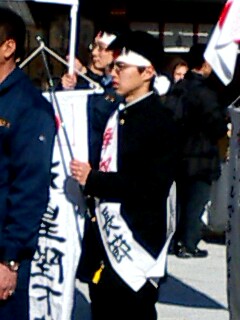
Tja, je bent zeventien, niet populair, slecht in sport, je schoolresultaten zijn matig, je hebt geen vrienden... Dan kun je in Japan twee dingen doen die door de maatschappij gedoogd worden: of je sluit je op in je kamer en communiceert nog slechts via je computer, of je sluit je aan bij een ultranationalistische knokploeg. Wie geïnteresseerd is in het verhaal van deze jongen, die klaarblijkelijk voor de tweede optie heeft gekozen, leze Oë Kenzaburo's briljante novelle 'Seventeen'.
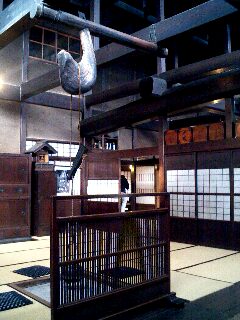
Een oud koopmanshuis in het centrum van Takayama, op fraaie, gestileerde wijze vormgegeven.

Het openluchtmuseum van Takayama, waar traditionele boerderijen uit het omringende hooggebergte te bezichtigen zijn. De opmerkelijke daken - gassho-zukuri genaamd - zijn zo steil opdat ze niet bezwijken onder het gewicht van de vele sneeuw die hier 's winters valt.

Een fraai voorbeeld van een Gassho-zukuri boerderij uit de Japanse alpen, compleet met het zo karakteristieke dak.
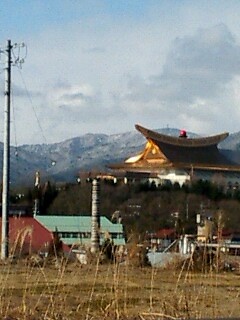
Het dak van de Mahikari-Schrijn. Voor een indicatie van het formaat: deze foto is genomen vanaf een paar honderd meter afstand. Het ding is nauwelijks kleiner dan de Sint Pieter, kortom - en getuigt van evenveel megalomanie, als je het mij vraagt.
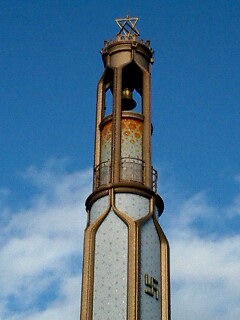
De minaret van de Grote Schrijn vanwaaruit de dames en heren van Mahikari vrede over de wereld aan het verspreiden zijn. Let vooral even op de creatieve combinatie van een (driedimensionale) Davidsster, op de top, en de swastika, beneden. Ik weet het, de swastika is óók een religieus (boeddhistisch, Keltisch) symbool - maar ik kan die andere associatie toch niet helemaal van me afzetten. Leuk onderwerp voor een werkstuk... Voor meer informatie over ons bezoek aan de Mahikari-schrijn, lees verderop op deze site het uitgebreide reisverslag van de dagen die we in Takayama doorbrachten.

Een wandeling langs de vele tempels en heiligdommen aan de rand van Takayama bracht ons langs verscheidene prachtige plekjes - waaronder deze rij torii.
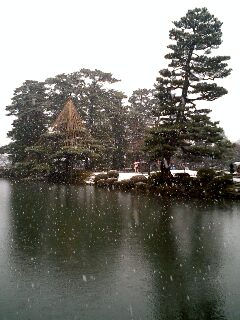
De Kenroku-en, naar verluidt één van de drie mooiste tuinen in Japan, en de belangrijkste toeristische trekpleister van de aangename historische stad Kanazawa. Het was een mistroostige, koude en natte oudjaarsdag waarop wij haar bezochten - maar op een bepaalde manier gaf het grauwe wit van het op dat moment bijna voorbije jaar de tuin nog een extra dimensie. Melancholiek, vergankelijkheid en subtiliteit - alle heerlijke clichés over de Japanse esthetiek werden even bewaarheid.

De fraaie wigwamvormige constructies zorgen ervoor dat tere jonge boompjes niet bezwijken onder het gewicht van de sneeuw, maar dat ze netjes rechtop blijven staan.
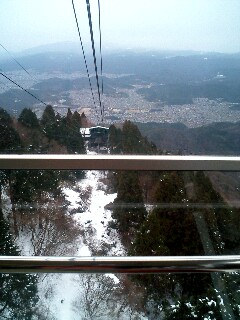
De kabelbaan die naar Hiei-zan gaat, de tempelberg waarop zich het Enryaku-ji tempelcomplex bevindt. De Enryaku-ji is het hoofdkwartier van de Tendai-school, die eeuwenlang de machtigste school was binnen het Japans boeddhisme, en ook de nodige politieke invloed uitoefende (het feit dat de school kon beschikken over een uitstekend getraind leger van vechtmonniken die zo nodig in staat waren de hoofdstad Heian, het huidige Kyoto, aardig te tyranniseren speelde hierbij geen kleine rol - voor zover het pacifistische karakter van het Boeddhisme in Japan). Doordat in de 16e eeuw een slimme generaal bedacht dat hij die dreiging het beste het hoofd kon bieden door alle monniken zonder aanziens des persoons af te slachten en vervolgens het tempelcomplex in de fik te steken, is er van de oorspronkelijke gebouwen (een paar duizend) nog slechts een handvol over. Desalniettemin is een bezoek aan de Hiei-zan zeer de moeite waard: er bevinden zich nog enkele prachtige tempels, en het uitzicht is werkelijk majesteus. Maar het mooiste zijn nog die verlaten, besneeuwde houten tempeltjes die verstopt zitten tussen die hoge naaldbomen.

Het was wel een beetje koud.
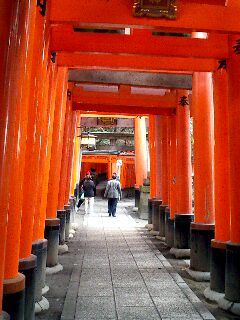
Eén van de makkelijkste manieren om een boeddhistische tempel en een Shinto-heiligdom uit elkaar te houden is de toegangspoort. Een tempel heeft vaak een grote, massieve poort, waarin zich als het even kan twee vervaarlijk ogende, rechtstreeks uit één der onderwerelden stammende wachters bevinden; een Shinto-heiligdom heeft nagenoeg altijd een torii bij de ingang staan.
Een torii is een poort die de grens markeert tussen twee werelden. Aan de ene kant van de torii bevindt zich onze wereld, de wereld van de mensen. Deze wereld is onrein, en wordt steeds opnieuw verontreinigd, als gevolg waarvan er ziekte en ongeluk voorkomen. Aan de andere kant van de torii echter bevindt zich de wereld van de goden, de geesten en de voorouders; deze wereld mogen mensen in principe alleen betreden wanneer zij zich vantevoren gereinigd hebben en bepaalde regels in acht nemen, want de handelingen van de bewoners van deze wereld zijn van grote invloed op de gebeurtenissen onze wereld. Men dient de heilige ruimte derhalve met een gepaste eerbied te betreden - wat niet wegneemt dat tegenwoordig weinig mensen, met uitzondering van priesters en tempeldienaressen, zich nog echt iets aantrekken van reinheidsvoorschriften wanneer zij een torii doorgaan en de heilige ruimte betreden.
Bij sommige heiligdommen, waaronder deze Fushimi Inari Jinja, bevinden zich niet één of enkele torii, maar letterlijk kilometerslange rijen die een onvergetelijke wandeling opleveren. Een grote rode hemelpoort, als het ware.

Tijdens de eerste dagen van het nieuwe jaar bezoeken de meeste Japanners één of meerdere Shinto-heiligdommen om daar te bidden en amuletten te kopen voor het nieuwe jaar. Dit eerste bezoek van het nieuwe jaar aan een heiligdom heet hatsumode, en is één van de belangrijkste religieuze en sociale festiviteiten van het jaar. Om de drukte in goede banen te leiden wordt soms politie ingezet, zoals op deze foto, die genomen is in Kanazawa op nieuwjaarsdag.

Tussen Kanazawa en Kyoto: Het fraaie kasteel van Hikone, aan het Biwa-meer.

De zandtuin van de Ginkaku-ji, één van de beroemdste Zen-tempels van Japan. Ofschoon het zand werkelijk fraai gerangschikt is, is de Ginkaku-ji toch een beetje een afknapper. Wanneer je je door de busladingen collega-toeristen hebt doorgeworsteld om eindelijk een plekje te bemachtigen vanwaar je een mooie foto kunt maken, blijkt namelijk dat de tuin, ofschoon aardig, niet opweegt tegen de schoonheid die je bij de Ryoan-ji of de Daitoku-ji aantreft, en dat de tempel zelf weinig meer is dan een veredelde boshut met een scharminkel van een weerhaan op het dak. Een beetje een 'tourist trap', op z'n Lonely Planets gezegd. Voor een inhoudelijke kennismaking met Zen lijken sommige andere plaatsen me dan ook geschikter.
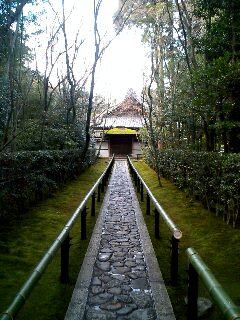
Het paadje dat leidt naar één van de meest schitterende, subtiel vormgegeven theepaviljoens in het land. Deze plek, waar de legendarische theemeester Sen-no-Rikyu doceerde, is ondanks de toeristen die er komen een baken van rust. Alleen al de in eenvoud en balans uitmuntende bemoste tuin, bewoond en onderhouden door een groep onzichtbare boeddhistische elfjes, is een kunstwerk dat een bezoek meer dan de moeite waard maakt. Dit fraaie voorbeeld van Zen-(tuin)architectuur bevindt zich op het tempelcomplex van de Daitoku-ji tempel in Kyoto.

De besneeuwde pagode van Amida Boeddha, bovenop de Hiei-zan.
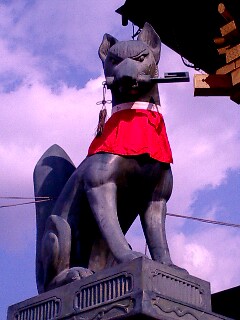
De vos is een belangrijk dier binnen de Japanse (volks)religie. Hij fungeert onder meer als boodschapper van de Shinto-godheid Inari (één van de belangrijkste goden binnen het immens grote Shinto-pantheon; oorspronkelijk de god die de rijstoogst coördineerde, momenteel ook zeer actief in de zakenwereld). Deze foto is genomen bij de ingang van de Fushimi Inari Jinja (in Kyoto), één van de belangrijkste, levendigste en meest intrigerende Shinto-heiligdommen in Japan.
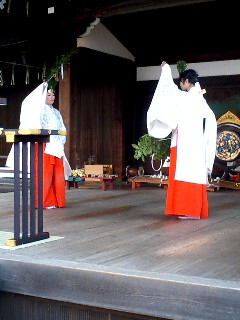
Twee miko-sama voeren een strak gechoreografeerde offerdans uit op hypnotiserende muziek. Miko-sama zijn tempeldienaressen binnen een Shinto-heiligdom, die zich tegenwoordig vooral bezighouden met het verkopen van amuletten en dergelijke, maar oorspronkelijk - en nog steeds soms - ook een belangrijke functie hadden als sjamanen die in staat waren te communiceren tussen de mensen- en de godenwereld.

Verscheidene kleine torii, geschonken door individuele gelovigen als eerbetoon aan de god Inari; tevens middel om een bepaalde wens of gebed kracht bij te zetten.

Het graf van de leider van de '47 ronin'; een groep werkloze, verwende samurai die bij wijze van primitieve eerwraak met z'n zevenenveertigen één man afslachtten (hoezo eervol?) - een daad die de gemiddelde geweldminnende Japanner tegenwoordig met veel heimwee naar de goede oude tijd beschouwt als één van de grote heroïsche gebeurtenissen uit de vaderlandse geschiedenis.
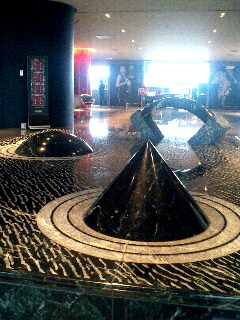
Gezien op de hoogste verdieping van een wolkenkrabber in Shinbashi: een schitterende moderne versie van een traditionele Zen-tuin.
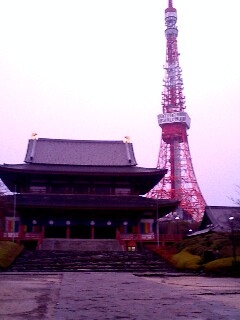
De Zojo-ji, de familietempel van de familie Tokugawa (de familie die tussen, pak hem beet, 1600 en 1868 Japan regeerde); tevens één van de fraaiste tempels van Tokyo. Op de achtergrond Tokyo Tower, die weliswaar min of meer dezelfde vorm heeft als de Eiffeltoren (en zelfs enkele meters hoger is), maar toch vooral de associatie oproept van een boortoren met een groeiziekte.
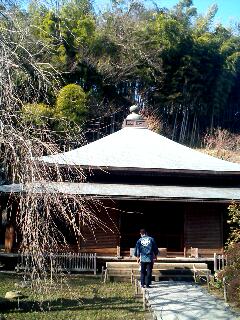
Een dagje naar Kamakura, het fraaie historische tempelstadje ten zuiden van Tokyo. Deze tempel, de Tokei-ji, was oorspronkelijk een nonnentempel, die niet door mannen betreden mocht worden. De dames die hier woonden waren over het algemeen gescheiden van hun echtgenotes, die ze door non te worden van zich af konden houden - een middeleeuws blijf-van-mijn-lijfhuis, zogezegd. Na 1900 werd het een 'gewone' boeddhistische tempel - zij het een zeer fraaie. Leuk detail: het graf van de eerste Japanner die een gouden medaille won op de Olympische Spelen bevindt zich ook hier. De beste man won goud op het onderdeel hink-stap-sprong tijdens de Spelen van 1928 in Amsterdam.
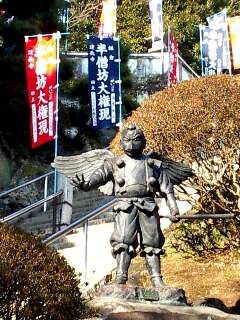
De wachters bij een Shinto heiligdom, hoog op een heuvel in Kamakura. Geen toegang voor onbevoegden, zeg maar.

De fraaie bus die rijdt van het station van Kamakura naar de Daibutsu (het grote beeld van Amida Boeddha; de boeddha die ons redt van ons lijden door ons, mits wij in hem geloven, wedergeboren te laten worden in zijn paradijs - waar hebben we dat vaker gehoord...?).

Namu Amida Butsu. Het blijft een prachtig beeld.

Minato Mirai, een futuristische illusie met ontelbare lichtjes. Met, niet te vergeten, de zogenaamde Landmark Tower, 's lands hoogste bouwwerk (links). Deze speeltuin voor gelovige kapitalisten en verliefde stelletjes bevindt zich in Yokohama.
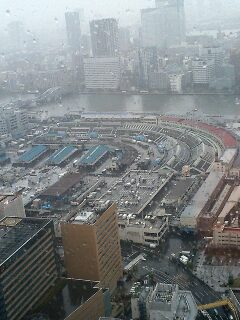
De vismarkt van Tsukiji, gezien van bovenaf. De grootste vismarkt van de wereld voorziet dagelijks vele miljoenen mensen van werkelijk alles wat zich in de zee bevindt. Een wandeling over deze overdekte markt is een fascinerende bezigheid (zij het niet geheel ongevaarlijk; overal slalommen gemotoriseerde karretjes tussen de kraampjes door, terwijl slang sprekende mannen in kaplaarzen wanneer je niet oplet een plens afvalwater over je heen gooien). Kolossale blokken tonijnvlees, kisten vol zeeëgels, schelpen met vormen die je normaal alleen aantreft in Disneyfilms, vuurrode octopussen met gapende zuignappen, krioelende kreeftachtigigen die rechtstreeks van Saturnus lijken te zijn komen aanvliegen... En meer vissen dan honderd hongerige weeshuizen ooit opkunnen.

Octopussen, gereed om geconsumeerd te worden.

Eet smakelijk.
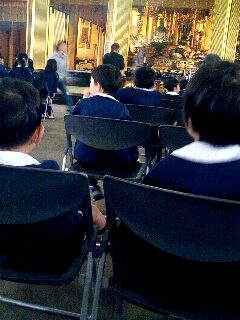
Kinderen van een kleuterschool bezoeken de Honganji tempel in Tsukiji (een kolossaal gedrocht dat meer doet denken aan het regeringsgebouw van Brits Indië dan aan een Japanse boeddhistische tempel; tevens hoofdtempel van de Jodo Shinshu school van het Reinelandboeddhisme in Oost-Japan), alwaar zij leren hoe zij tot Amida Boeddha moeten bidden.

Het Tokyo National Museum. Een museum met een prachtige, zeer uitgebreide collectie, waarvan slechts een frustrerend klein gedeelte te bezichtigen is - wat niet wegneemt dat er een aantal fascinerende topstukken te zien is dat een bezoek meer dan de moeite waard maakt, variërend van intrigerende Noh-maskers die een liefhebber doen watertanden, tot een schitterende versleten theekom die in zijn eentje de verpersoonlijking is van 'mono no aware' (het pathos der dingen; zie ook Cees Nooteboom en Yasunari Kawabata). Een feest om in rond te lopen derhalve, ondanks de ietwat populistische, oppervlakkige inrichting.
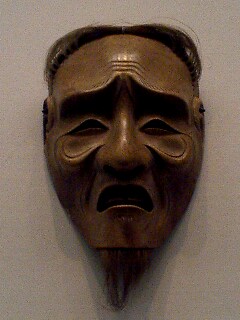
Wie het leukste onderschrift verzint, krijgt een biertje van me!

Japanners doen hele leuke dingen met de Engelse taal. Deze vrolijke tekst verwelkomde ons toen wij weer eens een bezoek brachten aan een karaokepaleis.
